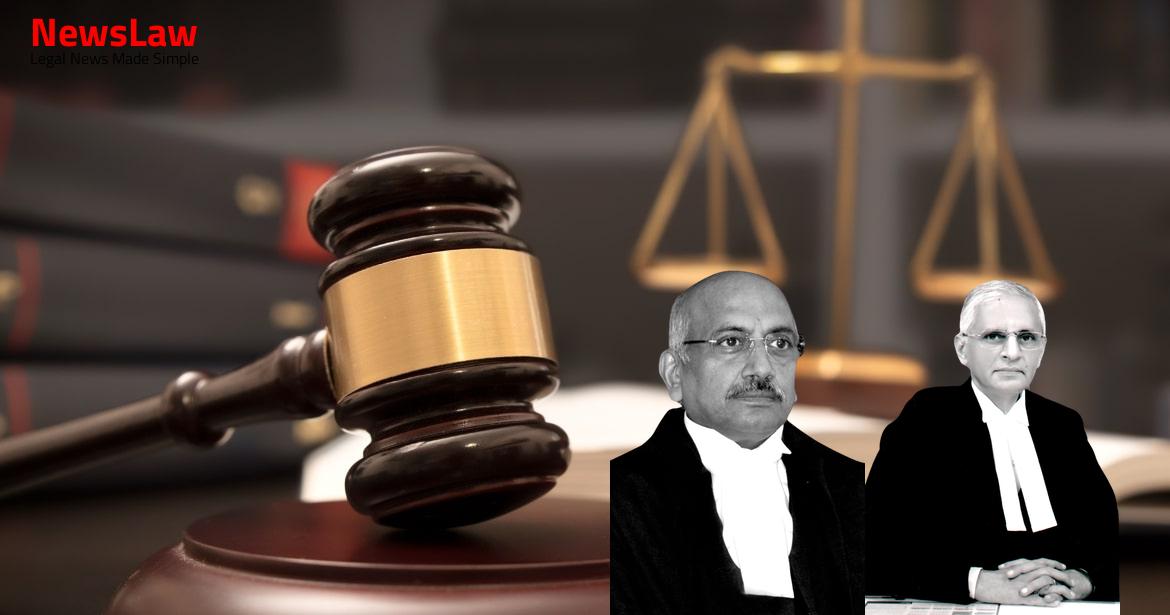Delve into the details of a significant legal case focusing on the commencement date of the Gratuity Act amendment. The court’s thorough analysis of retrospective application, statutory interpretation, and constitutional validity of cut-off dates provides valuable insights into the complexities of legal proceedings. Stay informed with this informative summary.
Facts
- The appellants were paid gratuity in accordance with an office memorandum.
- The Payment of Gratuity Act was later amended by Central Act No 15 of 2010.
- The High Court of Jharkhand declined the appellants’ claim to declare the applicability of the Payment of Gratuity (Amendment) Act, 2010 from 1.1.2007.
- The Amending Act came into force on 24.5.2010 as per a notification issued by the Government of India.
- The gratuity for employees of Central Sector Enterprises, including Coal India Limited where the appellants worked, was enhanced to Rs.10 lakhs w.e.f. 1.2007.
- The grievance of the appellants relates to tax deduction at source on gratuity paid before the commencement of the Amending Act.
Also Read: Interpretation of Will and Hindu Succession Act: Legal Analysis
Arguments
- The appellants challenge the commencement date of the Gratuity Act, stating it should be effective from 1.1.2007 instead of 24.5.2010.
- Referring to the Gratuity Act and Income Tax Act provisions pre-amendment, the appellants argue against the date of commencement.
- Counsel for the appellants cite the judgement in D.S. Nakara & Ors. v. Union of India, claiming that the cut-off date of 24.5.2010 creates arbitrary classifications of employees based on superannuation dates.
- Mr. Vikramjit Banerjee, representing the Union, argues that the pensioners’ case in D.S. Nakara’s judgment differs from the gratuity scenario due to recurring versus one-time payments.
- The appellants assert that the amendment to the Gratuity Act aims at providing enhanced benefits, seeking a retrospective view based on liberalized benefits.
- Counsel for the appellants rely on the judgment in Commissioner of Income Tax (Central)-I, New Delhi v. Vatika Township Private Limited to support their argument.
- Benefit of gratuity is argued to be different from the recurring payment of pension.
- The argument is that the benefit of gratuity stands on a different footing compared to pension payments.
Also Read: Legal Analysis of Pujaris’ Rights in Temple Land Ownership
Analysis
- The provisions of the statute cannot be considered retrospective as the Gratuity Act specified rupees ten lakhs as the amount of gratuity only from 24.5.2010.
- The amendment in the Gratuity Act regarding the amount of gratuity cannot be treated as retrospective.
- The case involved the insertion of a proviso to Section 113 of the Income Tax Act, increasing tax chargeable under that section by a surcharge, applicable in the assessment year relevant to the previous year in which the search was initiated under Section 132 of the said Act.
- The court held that the cut-off date for the amendment was not illegal as it involved a one-time payment.
- The amount of gratuity received under the Gratuity Act is exempt from the Income Tax Act, provided it does not exceed the amount calculated under the provisions of subsections (2) and (3) of Section 4 of the Gratuity Act.
- The cut-off date for granting pension benefits has been held as arbitrary by the court.
- The court has emphasized that pension is payable periodically as long as the pensioner is alive.
- Gratuity under the Gratuity Act is a one-time payment, and the employee has the right to receive better terms of gratuity under any award or contract.
- The court has held that the price prevailing at the date of sale alone is payable, not the higher price introduced by an amendment.
- The empowerment of the executive to choose the date of commencement of an act has been upheld by the court.
- Payment of gratuity from a specified date of retirement was deemed constitutional by the court.
- In a case related to increased gratuity payment, a cut-off date was considered non-arbitrary due to financial constraints.
- The appellants’ gratuity payment based on an office memorandum dated 26.11.2008 falls within a specific sub-section.
- A case involving the effective date of a new rate for rice supply raised the issue of whether earlier supplies would benefit from a later notification.
- The date of commencement fixed by the Executive under the Amending Act cannot be considered retrospective as the benefit of higher gratuity is a one-time offer available only after the Amending Act comes into effect.
- The benefit paid to the appellants under the office memorandum is not eligible for exemption, as per the specific language of Section 10(10)(ii) of the Income Tax Act.
- No error was found in the order passed by the High Court based on the above reasoning.
Also Read: Land Compensation Redetermination Case
Decision
- The appeal is dismissed.
- The appellant’s arguments were found to be unpersuasive.
- The court upheld the lower court’s decision.
- No grounds for overturning the ruling were identified.
- The judgement is considered final.
Case Title: KRISHNA GOPAL TIWARY AND ANR. Vs. UNION OF INDIA AND ORS. AND ORS. MINISTRY OF COAL (2021 INSC 401)
Case Number: C.A. No.-004744-004744 / 2021



